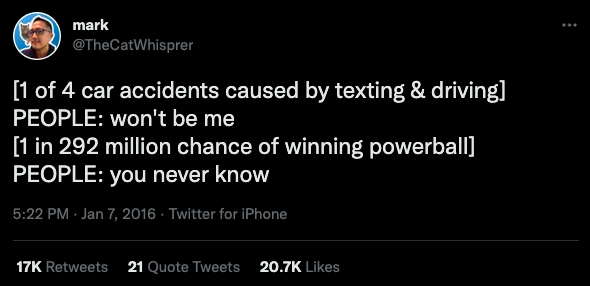
Source: TheCatWhisprer on Twitter
Have you ever seen an article or watched a story on the local news about someone who's won the lottery?
How did you feel after you watched it? Did you feel like your own chances of winning went up or down?
If you got a little nagging feeling in your stomach that you should run down to the gas station and get a ticket — just in case — you're not alone.
You're the victim of something called Availability Bias.
What is Availability Bias?
The Availability Bias (also called the Availability Heuristic) says that our brains tend to make decisions based on two kinds of information:
- A recent memory
- A vivid memory
Our brain thinks things that have happened recently or stand out in our minds are more likely to happen again. It's because things that have just happened are top of mind, so it comes to mind quickly and easily. When an event is easier to remember, it becomes easier to imagine it happening again.
When an event is easier to remember, it becomes easier to imagine it happening again.
It's why you're less likely to go for a swim at the beach after the news runs a story about a series of recent shark attacks. You're no more likely to get eaten by a shark, but when your brain sees the ocean now, it thinks, "Sharks!" because you just heard about a shark attack.
It's the same effect that happens when we think about car accidents, plane crashes, and other catastrophic events. We're not relying on accurate information, just recent information and vivid memories.
And that leads to bad decision-making.
Availability Bias is a Type of Cognitive Bias
Availability Bias is a type of cognitive bias - a systematic error in thinking. A cognitive bias works as a mental shortcut for making decisions or judgments about a situation. Everyone is susceptible to cognitive bias, no matter their age, gender, or cultural background — they're just a quirk of human behavior.
Why Do Cognitive Biases Exist?
Our brains need to take in an incredible amount of information, but it also wants to save as much thinking energy as possible. So, it relies on generalities or rules of thumb (also called heuristics) to help it make hard decisions fast.
You can think of a cognitive bias as an information filter through which objective information flows and is transformed as it passes through. Like coffee grounds and water changing into coffee — it's the same ingredients but a slightly different experience once it's transformed.
We rely on cognitive biases when we're emotional, rushed to decide, or feel social pressure to make a choice. But everyday thinking and decision-making are subject to cognitive biases as well.
Examples of Availability Bias In the Real World
Before we go on, which one of the following do you think is most likely to happen?
- A massive flood happening somewhere in North America
- A gigantic flood happening because of an earthquake in California

Source: Created by the author
1. When It's Easier to Imagine, It's Easier to Remember
Nobel prize-winner Daniel Kahneman and his research partner Amos Tversky examined this question in a study. Half of the study participants were asked to guess the chances that a huge flood would happen in North America. The other half were asked to guess the chances of a flood happening because of an earthquake in California.
Spoiler: The possibility of a flood anywhere in North America will always be bigger than the possibility of one in California.
But what did the participants say?
They responded that the highest chance of a massive flood was in California instead of all of North America. Why? Availability Bias kicked in, and participants relied on vivid or recent memories. The mental story of earthquake = California = flood was specific, potentially recent, and easier to imagine than a flood somewhere in North America.
2. Media Coverage Can Blow Problems Out of Proportion
In 1993, Russell Eisenman examined how media coverage impacts perceptions of how common or uncommon a particular crime might be. He asked American college students if drug use in the country was going up or down.
Even though national data said that drug use was going down, students mostly said that drug use was increasing.
Why?
Eisenman blamed a combination of non-stop news stories combined with the Availability Bias. When the media ran non-stop stories about a particular topic, like they were doing with drug use at the time, it could make people believe that a crime was more common than it actually was.
🚀 Learn what makes buyers tick
Join 8k+ of world's best marketers from brands like Disney, Coca-Cola, Google who are learning marketing psychology in <5 mins a week.
The Bottom Line
As with any cognitive bias, it's not enough to know that it exists. You have to fight your mind's tendency to rely on it. You can also follow a process like the one below to help keep yourself vigilant:
- First, be aware of the common cognitive biases (you've started that process with this article).
- Second, be attentive. Pay attention and actively work to combat cognitive biases in your decision-making process.
- Last, question yourself. Make sure you take the time to de-bias your thinking when making decisions.
